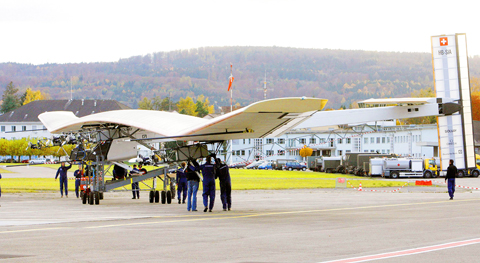Solar Impulse, the Swiss bid to make the first solar-powered flight around the world, rolled out its prototype on Friday at an airbase near Zurich and powered up the engines.
All four sun-fueled electric motors were switched on for the first time under open skies after the completed high-tech plane was pushed out of the hangar.
“With its engines running at full power, it gave the impression of wanting to get off the ground straightaway ... but it won’t be long now before we release the brakes and let it roll its first few meters,” said Andre Borschberg, co-founder and chief executive of Solar Impulse.

PHOTO: REUTERS
The ultralight single seater with the wingspan of an Airbus A380 airliner is being prepared for a maiden flight over the coming weeks when weather conditions allow.
Solar Impulse staff said the slender craft, which only weighs as much as a medium-sized car (1,600kg), needs particularly clear conditions and less than a light breeze (three knots) for its first excursion in the air.
It is due to make a few airborne hops down the runway at the Dubendorf airbase before Dec. 20.
Borschberg said the aircraft was venturing into new flying territory.
“Compared to its weight and size, it is lighter than the best performing gliders,” Borschberg said.
The prototype, which is slightly smaller than the craft that is expected to fly around the world, was first unveiled while it was being built in its hangar in June.
It is primarily aimed at testing the cutting edge technology used to build and control the aircraft, and to fly through the night.
A first non-stop 36 hour flight through darkness is planned in Switzerland next spring, with the prospect of a five stage flight around the world in 2012.

SECURITY: As China is ‘reshaping’ Hong Kong’s population, Taiwan must raise the eligibility threshold for applications from Hong Kongers, Chiu Chui-cheng said When Hong Kong and Macau citizens apply for residency in Taiwan, it would be under a new category that includes a “national security observation period,” Mainland Affairs Council (MAC) Minister Chiu Chui-cheng (邱垂正) said yesterday. President William Lai (賴清德) on March 13 announced 17 strategies to counter China’s aggression toward Taiwan, including incorporating national security considerations into the review process for residency applications from Hong Kong and Macau citizens. The situation in Hong Kong is constantly changing, Chiu said to media yesterday on the sidelines of the Taipei Technology Run hosted by the Taipei Neihu Technology Park Development Association. With

CARROT AND STICK: While unrelenting in its military threats, China attracted nearly 40,000 Taiwanese to over 400 business events last year Nearly 40,000 Taiwanese last year joined industry events in China, such as conferences and trade fairs, supported by the Chinese government, a study showed yesterday, as Beijing ramps up a charm offensive toward Taipei alongside military pressure. China has long taken a carrot-and-stick approach to Taiwan, threatening it with the prospect of military action while reaching out to those it believes are amenable to Beijing’s point of view. Taiwanese security officials are wary of what they see as Beijing’s influence campaigns to sway public opinion after Taipei and Beijing gradually resumed travel links halted by the COVID-19 pandemic, but the scale of

A US Marine Corps regiment equipped with Naval Strike Missiles (NSM) is set to participate in the upcoming Balikatan 25 exercise in the Luzon Strait, marking the system’s first-ever deployment in the Philippines. US and Philippine officials have separately confirmed that the Navy Marine Expeditionary Ship Interdiction System (NMESIS) — the mobile launch platform for the Naval Strike Missile — would take part in the joint exercise. The missiles are being deployed to “a strategic first island chain chokepoint” in the waters between Taiwan proper and the Philippines, US-based Naval News reported. “The Luzon Strait and Bashi Channel represent a critical access

Pope Francis is be laid to rest on Saturday after lying in state for three days in St Peter’s Basilica, where the faithful are expected to flock to pay their respects to history’s first Latin American pontiff. The cardinals met yesterday in the Vatican’s synod hall to chart the next steps before a conclave begins to choose Francis’ successor, as condolences poured in from around the world. According to current norms, the conclave must begin between May 5 and 10. The cardinals set the funeral for Saturday at 10am in St Peter’s Square, to be celebrated by the dean of the College